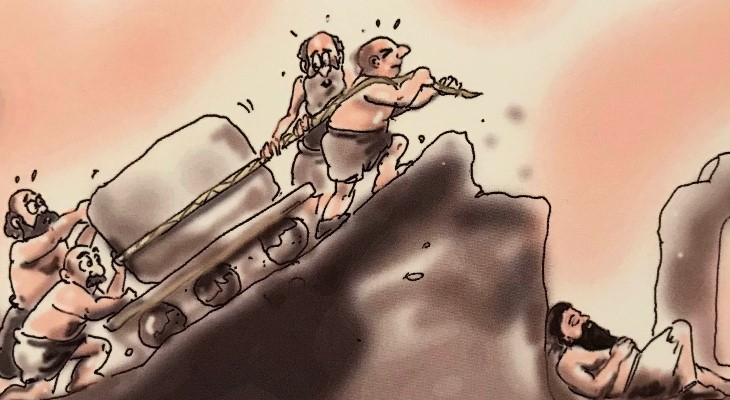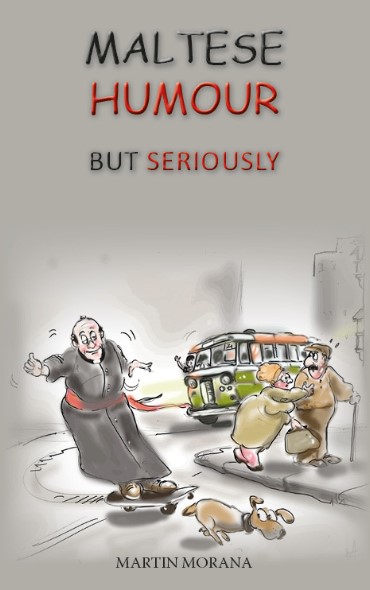Martin Morana’s book Maltese Humour But Seriously explores the Maltese approach to humour and enjoyment of laughter.

Martin Morana
“Maltese love to laugh, often, in small doses and when in the company of friends. This is when they are at their best to let loose some colourful mental fantasy in words. Maltese humour is not always evident because quite often it is treated as a personal accessory often suppressed due to the stressful way of modern life. Maltese humour may often be dormant; just like the genie in the lamp, it needs a genial idea to stimulate the brain into action to produce laughter.”
It’s safe to say that Martin Morana knows Malta. He has studied history at The University of Malta and has worked as a tour guide in Malta for over 20 years. Beyond that, he was employed with the Malta Tourism Authority for 28 years. Add to this a penchant for anthropology, and you have a gentleman who affords the ability to write about Maltese behaviour with an objective eye.

Lisa Borain
“Throughout my career in tourism, I always felt like Humpty Dumpty sitting on the wall, a spectator to both sides of the wall from a neutral distance. I completely understood things from the Maltese perspective, but then I was also constantly experiencing things from the tourists’ side as well. I have always been fascinated by who we are as Maltese and by how tourists or expats see us.”
After publishing three books focusing on the ancient origin of Maltese words, Martin decided to explore Maltese humour.
“I love humour. It’s a facet that’s very challenging. Initially, I was going to write a book on Maltese jokes. Then I discovered that I wanted to delve deeper and go into the psychology of it. Since there are so many different perceptions of Maltese people, I wanted to have insight on the type of humour the Maltese embody.”
Being a historian, Martin embarked on the project from the very beginning of humour. He traced any source of historic background and including the time to carry out research, it took approximately three years to write Maltese Humour But Seriously.

Martin Morana
The book is split into two: 'The way we laughed' (past tense; the historical side of things) and 'the way we laugh now' (a focus on the current state of humour). The author also raises a lot of questions - not only regarding what we laugh about, but about laughter in general. Is laughter humour?
“You can laugh to show a sense of understanding or togetherness, or to communicate. For instance, young children laugh to communicate, rather than laugh at something that’s actually funny,” Martin explains.
An in-depth analysis about humour raises further questions, such as whether humour is a form of aggression. Various different types of humour are highlighted, such as sarcasm, slapstick and irony. After analysing humour in general, Martin assessed the different types and instances of Maltese humour. “Your typical Maltese humour begins when people see each other and start having a conversation. It will start off with banter, which is light teasing. You often get this banter at work amongst colleagues as well."
“A lot of our humour is socio-political. Since politics is so divided in this country, there are constantly pokes at the opposition, whether in power at the time or not. We joke a lot when there’s a crisis. This is evident in our beloved pantos," he says.
“The Maltese also love their puns. It’s an easy way to joke in Maltese. They’re not together anymore, but when Brad Pitt and Angelina Jolie came to Malta to film, what did they eat? Braġjoli. See?"
“When watching humour, the older generation Maltese are more slapstick; Groucho Marx over Woody Allen. Our humour is a lot like Italian humour in this sense. A lot of us from the older generation don’t understand the humour trending with stand-up comedians nowadays. The younger generation is different because they have grown up with cable television, which offers them exposure to different humour, not just Italian," Martin continues.
“The interaction between locals and foreigners is one of the reasons the quality of humour changes, just like many ideas, beliefs and lifestyles… the subject of the joke is no longer set in rural life, the church and the village tavern; they now focus on modern day topics.”
Of course, to truly understand Maltese humour (or any nationality’s, really), you have to understand the language and the culture. However, for a light way to appreciate the history and the contemporary lifestyle of the Maltese a bit better, Martin’s book is a wealth of insight.
“During a church sermon, the priest asks the congregation… ‘Now tell me…! Who of you will want to go to hell? Obviously, no one replies and the whole congregation sit still. The priest asks the same question again. ‘Those of you who want to go to hell please stand up!’
Nobody moves. After a few awkward seconds, one man sheepishly stands up.
‘Tell me Sir,’ asks the priest, ‘why do you want to go to hell?’
‘Dear Reverend, I had to stand up because I see that you are the only one standing and I do not want you to go to hell all alone.’
‘Maltese Humour But Seriously’ is available from all leading bookstores in Malta & Gozo.